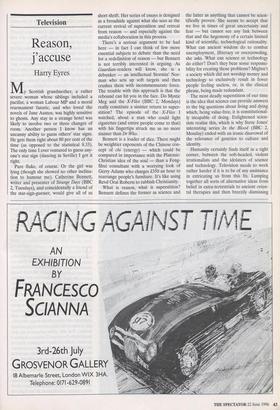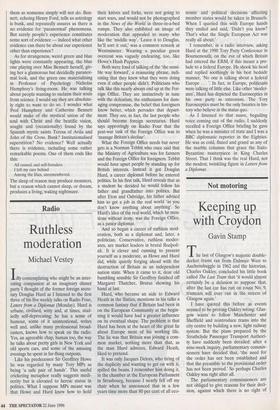Television
Reason, 'accuse
Harry Eyres
My Scottish grandmother, a rather severe woman whose siblings included a pacifist, a woman Labour MP and a moral rearmament fanatic, and who loved the novels of Jane Austen, was highly sensitive to ghosts. Any stay in a strange hotel was likely to involve two or three changes of room. Another person I know has an uncanny ability to guess others' star signs. He gets them right about 80 per cent of the time (as opposed to the statistical 8.33). The only time I ever ventured to guess any- one's star sign (dancing in Seville) I got it right.
Pure fluke, of course. Or the girl was lying (though she showed no other inclina- tion to humour me). Catherine Bennett, writer and presenter of Strange Days (BBC 2, Tuesdays), and coincidentally a friend of the star-sign-guesser, would give all of us short shrift. Her series of essays is designed as a broadside against what she sees as the current revival of superstition and retreat from reason — and especially against the media's collaboration in this process.
There's a serious argument to be had here — in fact I can think of few more essential subjects to debate than the need for a redefinition of reason — but Bennett is not terribly interested in arguing. As Guardian-readers will know, she is a debunker — an intellectual Stormin' Nor- man who sets up soft targets and then crushes them with incommensurate force. The trouble with this approach is that the rebound can hit you in the face. Do Mystic Meg and the X-Files (BBC 2, Mondays) really constitute a sinister return to super- stition? The episode of the X-Files I watched, about a man who could light cigarettes (and entire people come to that) with his fingertips struck me as no more sinister than Dr Who.
Bennett is a loader of dice. There might be weightier exponents of the Chinese con- cept of chi (energy) — which could be compared in importance with the Platonic- Christian idea of the soul — than a Feng- Shui consultant with a worrying look of Gerry Adams who charges £350 an hour to rearrange people's furniture. It's like using Revd Oral Roberts to rubbish Christianity.
What is reason, what is superstition? Bennett defines the former as science and the latter as anything that cannot be scien- tifically proven. She seems to accept that we live in times of great uncertainty and fear — but cannot see any link between that and the hegemony of a certain limited kind of scientific, technological rationality. What can ancient wisdom do to combat unemployment, illiteracy or overcrowding, she asks. What can science or technology do either? Don't they bear some responsi- bility for creating those problems? Mightn't a society which did not worship money and technology so exclusively result in fewer people feeling useless, or, in the clinical phrase, being made redundant.
The most deadly superstition of our time is the idea that science can provide answers to the big questions about living and dying which, being value-free, it is constitutional- ly incapable of doing. Enlightened scien- tists realise this, which is why Steve Jones' interesting series In the Blood (BBC 2, Monday) ended with an ironic disavowal of the relevance of genetics to culture and identity.
Humanity certainly finds itself in a tight corner, between the soft-headed, violent irrationalists and the idolaters of science and technology. Television needs to work rather harder if it is to be of any assistance in extricating us from this fix. Lumping together all sorts of alternative ideas from belief in extra-terrestrials to ancient orien- tal therapies and then breezily dismissing them as nonsense simply will not do. Ben- nett, echoing Henry Ford, tells us astrology is bunk, and repeatedly assures us there is no evidence for 'paranormal' phenomena. But surely people's experience constitutes some sort of evidence — indeed what other evidence can there be about our experience other than experience?
As for strangeness, weird green and blue lights were constantly appearing, the blue one playing over Miss Bennett herself, giv- ing her a glamorous but decidedly paranor- mal look, and the green one materialising in Professor of Psychology Nicholas Humphrey's living-room. He was talking about people wanting to reclaim their souls from science. I would say they are absolute- ly right to want to do so. I wonder what Prof Humphrey and Catherine Bennett would make of the mystical union of the soul with Christ and the beatific vision, sought and (occasionally) found by the Spanish mystic saints Teresa of Avila and John of the Cross. Bunk? Institutionalised superstition? No evidence? Well actually there is evidence, including some rather remarkable poems. One of them ends like this: All ceased, and self-forsaken
I left my care behind Among the lilies, unremembered.
The sleep of reason may produce monsters, but a reason which cannot sleep, or dream, produces a living, waking nightmare.



























































 Previous page
Previous page